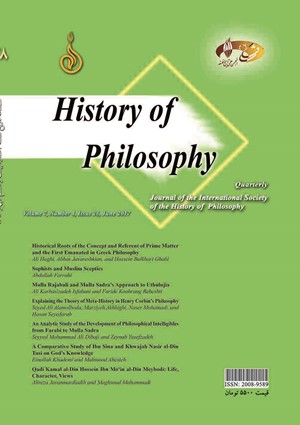Explaining the Theory of Meta-History in Henry Corbin’s Philosophy
Subject Areas : Interation of thoughts, effects of philosophers’ ideas on society and future philosophical standpointsSeyed Ali Alamolhoda 1 , Marziyeh Akhlaghi 2 , Naser Mohamadi 3 , Hasan Seyedarab 4
1 -
2 -
3 -
4 -
Keywords: Henry Corbin Suhrawardi’s philosophy theory of meta-history gnosis philosophy of history ,
Abstract :
Henry Corbin (1903-1978), the French philosopher, is the first western interpreter of Suhrawardi’s philosophy. His thoughts are focused on the fields of t’awil (esoteric interpretation), phenomenology, and the theory of meta-history. The present study aims to explain and examine this theory and its impact on Corbin’s study of Iranian-Islamic philosophy and gnosis. In the realm of theoretical studies of history, the philosophy of history derives from philosophical studies and, accordingly, investigates history and historical events and incidents. In Corbin’s view, it is not possible to investigate the reporting of the history of philosophy based on the theory of the philosophy of history because one cannot describe historical events based on cause-effect relationships. Corbin’s view in this regard is rooted in theology. In fact, he has employed a theological approach in order to interpret the relationship between history and human beings; the philosophical periods of ancient Iran; Islamic philosophy and, particularly, the philosophical school of Suhrawardi (540-587 AH), and gnosis. He has attributed the issues related to the mentioned fields to the world of Ideas. Corbin benefitted from the theories of Edmund Husserl (1859-1928) and Martin Heidegger (1889-1996) in order to pose the theory of meta-history. The present paper is a first attempt at examining and analyzing Henry Corbin’s theory of meta-history.
اعوانی، غلامرضا، «سیری در آراء هانری کربن»، زائر شرق (مجموعه مقالات همایش بزرگداشت یکصدمین سال تولد هانری کربن)، باهتمام شهرام پازوکی، تهران، مؤسسه پژوهشی حکمت و فلسفه ایران، 1385. #
بالانفا، پل، «هانری کربن و روش او»، زائر شرق (مجموعه مقالات همایش بزرگداشت یکصدمین سال تولد هانری کربن)، باهتمام شهرام پازوکی، تهران، مؤسسه پژوهشی حکمت و فلسفه ایران، 1385. #
پازوکی، شهرام، «ارتباط شیعه، تصوف و ایران نزد هانری کربن»، عرفان ایران (مجموعه مقالات)، گردآورنده سیدمصطفی آزمایش، تهران، نشر حقیقت، ش19، 1383. #
پازوکی، شهرام، «ارتباط شیعه، تصوف و ایران نزد هانری کربن»، زائر شرق (مجموعه مقالات همایش بزرگداشت یکصدمین سال تولد هانری کربن)، تهران، مؤسسه پژوهشی حکمت و فلسفه ایران، 1385. #
شایگان، داریوش، «دیدارهای هانری کربن»، در احوال و اندیشههای هانری کربن، تهران، انتشارات هرمس و انجمن ایرانشناسی فرانسه در ایران، 1379. #
مجتهدی، کریم، «فلسفههای ایرانی ـ اسلامی از نظرگاه کربن»، زائر شرق (مجموعه مقالات همایش بزرگداشت یکصدمین سال تولد هانری کربن)، باهتمام شهرام پازوکی، تهران، مؤسسه پژوهشی حکمت و فلسفه ایران، 1385. #
Corbin, Henry, En Islam Iranien Aspects spirituels et philosophiques, vol.2, France: Editions Gallimard, 1971. #
Corbin, Henry, “De Heidegger à Sohravard”, in Henry Corbin, Christian Jambet, Paris, 1981. #
Corbin, Henry, Itineraire dun Enseignement, Tehran, Institut Fracais De Recherche Iran, 1993. #
Corbin, Henry, Les Motifs Zoroastriens Dans La Philosophie De Sohrawardi, Tehran, Iranian Linstitute Of Philosophy, 2012. #
Corbin, Henry, Philisophie Iranienne et Philisophie Comparée, Tehran, Iranian Institute of Philosophy, 1382. #
Gordon, Grahame, “Philosophy of History”, Routledge Encyclopaedia of Philosophy, London, 1998. #
Shayegan, Daryush, Henry Corbin: La Topographie Spirituelle de l'islam iranien, Paris, Editions de la difference, 1990. #


